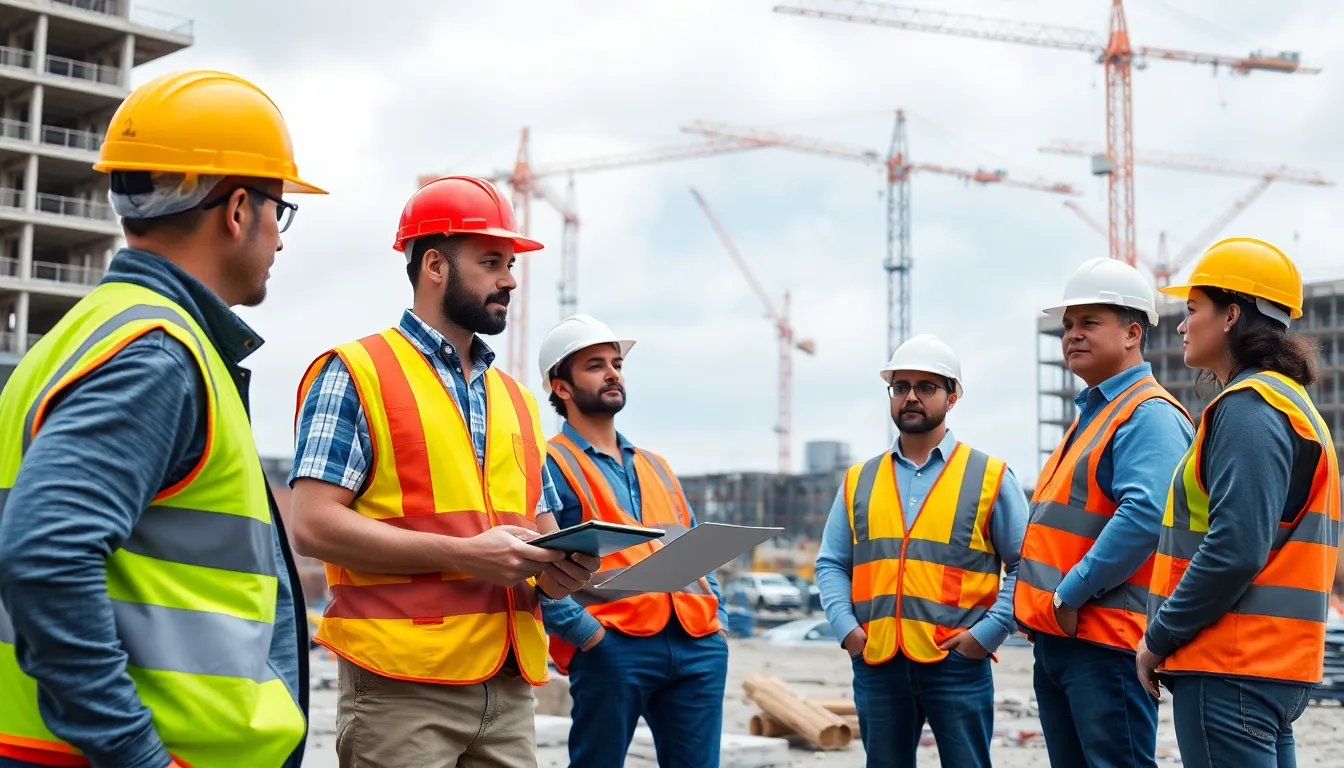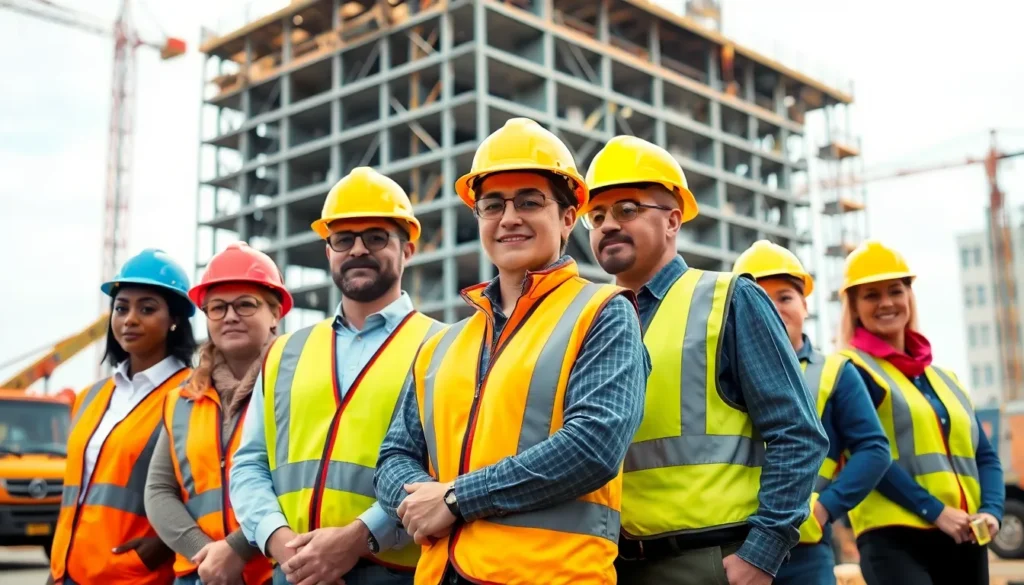Table of Contents
ToggleWhen it comes to commercial building construction, choosing the right company is like picking the perfect avocado—one wrong move and you’ll end up with a disaster. These companies are the backbone of the skyline, transforming blueprints into towering realities. They’re not just about bricks and mortar; they’re about crafting spaces where businesses thrive and communities connect.
In a world where first impressions matter, a well-constructed building can make all the difference. Commercial construction companies blend innovation with expertise, ensuring that every project meets the highest standards. Whether it’s an office complex or a retail space, these professionals turn visions into tangible structures, proving that construction can be both functional and fabulous. So, let’s dive into the world of commercial building construction and discover what makes these companies the unsung heroes of the urban landscape.
Overview of Commercial Building Construction Companies
Commercial building construction companies focus on the development and construction of structures that house businesses. They play a crucial role in the real estate ecosystem, shaping urban environments and supporting economic growth.
Definition and Scope
Commercial building construction companies specialize in constructing various types of non-residential structures. These entities handle projects that include office buildings, retail spaces, warehouses, and institutional facilities. Their expertise ensures adherence to regulatory standards, safety codes, and design requirements. Project management, skilled labor, and collaboration with architects and engineers are fundamental to their operations.
Importance in the Construction Industry
Commercial building construction companies significantly impact the industry by driving innovation and economic development. Their work ensures the delivery of high-quality structures that attract tenants and stimulate local economies. Efficiency and sustainability are often at the forefront of their practices, promoting environmentally friendly construction methods. By creating well-designed, functional spaces, these companies help businesses thrive and foster community growth.
Types of Commercial Building Construction

Commercial building construction encompasses various types, each serving distinct purposes in non-residential development. Key categories include new construction and renovations or restorations.
New Construction
New construction refers to the complete building of structures from the ground up. Developers often choose this route to create custom designs tailored to specific business needs. In addition, this process includes obtaining necessary permits and following zoning regulations. Consequently, new commercial buildings—such as office towers, shopping centers, and industrial facilities—reflect innovative architectural trends and can utilize advanced materials for sustainability. Many companies leverage cutting-edge technologies, enhancing energy efficiency and sustainability, crucial in today’s competitive market.
Renovations and Restorations
Renovations and restorations involve updating or repairing existing buildings to enhance functionality or aesthetics. Companies typically address outdated layouts, improve energy efficiency, or restore historical features, ensuring compliance with current codes. Property owners often pursue these projects to adapt spaces for modern use or to preserve significant architectural elements. Projects might include repurposing warehouses into office spaces or refurbishing retail stores, demonstrating versatility in transforming aging structures. These efforts not only revitalizet neighborhoods but also contribute to environmental sustainability by reducing waste associated with new construction.
Key Players in the Industry
The commercial building construction industry features a diverse array of companies, ranging from large firms to regional and local specialists. Each player contributes uniquely to the landscape of construction.
Large Construction Firms
Large construction firms dominate the commercial building sector by managing extensive projects across various markets. These companies often have nationwide or global reach, offering comprehensive services that include project management, design, and construction. Their resources enable them to tackle multi-million dollar projects, such as corporate headquarters and large retail complexes, with efficiency. Examples of these firms include Turner Construction and Bechtel, known for their expertise and ability to navigate complex regulatory frameworks. Their advanced project management techniques contribute to timely and on-budget completions, making them leaders in the industry.
Regional and Local Companies
Regional and local companies focus on specific markets, bringing tailored expertise to their communities. Often, these businesses prioritize personal relationships with clients, understanding local needs and preferences. They excel in delivering customized solutions for smaller projects, such as office renovations or retail stores, while adhering to local zoning laws. Many of these firms leverage partnerships with local architects and suppliers, ensuring that their projects reflect community character. Companies like Smith & Sons Construction highlight the agility and responsiveness of regional players, helping to drive local economic development through their focused projects.
Factors to Consider When Choosing a Company
Selecting the right commercial building construction company involves evaluating several critical factors. These considerations ensure that the chosen firm aligns with project goals and expectations.
Experience and Expertise
Experience matters greatly in commercial construction. Companies with extensive experience bring a wealth of knowledge to various project types. Look for firms that specialize in specific building sectors such as offices or retail. Proven expertise fosters confidence in navigating complex regulations and safety codes. Prioritize companies that showcase successful completion of similar projects, demonstrating their ability to meet timelines and budgets.
Project Portfolio
A strong project portfolio reflects a company’s capabilities. Reviewing past projects helps potential clients gauge the quality of work. Examine the diversity of completed projects, as a varied portfolio indicates adaptability to different client needs. A company with innovative designs and successful renovations illustrates creativity and skill. Ask for case studies or detailed project descriptions to understand each project’s scope and outcomes better.
Trends in Commercial Building Construction
Commercial building construction continues to evolve with notable trends that reflect current industry demands.
Sustainable Practices
Sustainable practices shape modern commercial construction, emphasizing eco-friendly materials and energy-efficient designs. Many companies adopt green building certifications, such as LEED, to demonstrate their commitment to environmental responsibility. Increased insulation, renewable energy sources, and water conservation systems all contribute to reduced operational costs and smaller carbon footprints. Incorporating recycled materials and reducing waste management costs stands central to this approach. Additionally, biophilic design integrates nature into building spaces, enhancing occupant well-being.
Technological Innovations
Technological innovations reshape how commercial buildings are designed and constructed. Building Information Modeling (BIM) facilitates efficient project management through three-dimensional visualization, allowing for better collaboration among teams. Drones assist in site surveys, providing real-time data and monitoring progress. Prefabrication technology accelerates construction timelines and reduces labor costs by assembling components off-site. Smart building technologies enhance energy management and improve operational efficiency through automated systems. Virtual reality tools offer clients immersive experiences, enabling them to explore designs before construction begins.
Choosing the right commercial building construction company is a pivotal step in shaping successful projects. The expertise and innovation these firms bring to the table not only influence the quality of the construction but also enhance the overall business environment. By prioritizing sustainability and leveraging advanced technologies, they adapt to the ever-changing demands of the industry.
As businesses seek to create spaces that foster growth and community engagement, partnering with the right construction company becomes essential. This choice ultimately impacts not just the structure itself but the broader economic landscape, making it crucial for developers and business owners alike to make informed decisions.







